San Francisco could soon be the first city in the nation to open what are known as supervised injection sites, where addicts can shoot up indoors under the care of trained medical staff. The plan, both controversial and illegal in the U.S., aims to reduce the number of overdose deaths in the San Francisco as well as the staggering amount of used needles scattered across the city.
Taskforce Recommends "Multiple" Drug Sites in SF
“We need a new solution,” said Dr. Alex Kral, an infectious disease specialist with the nonprofit research institute RTI International. “Even just adding one of these sites to San Francisco would save the city $3.5 million dollars a year because of the savings in reduced HIV, viral hepatitis, and overdoses.”
Kral, who has been studying drug use in San Francisco for 25 years, was one of 15 people to serve on a government task force aimed at studying supervised injection sites and their potential impacts to drug users and the community. The panel, which included representatives from San Francisco’s police and health departments, recommend the city open “multiple safe injection service sites.”
Get Southern California news, weather forecasts and entertainment stories to your inbox. Sign up for NBC LA newsletters.
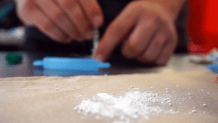
San Francisco to Open Nation's First Supervised Drug Sites
San Francisco now plans to open two supervised injection sites by August, which would likely be followed by several more within the next year. The move is a response to an explosion of public drug use and the dangerous paraphernalia that is often left behind on San Francisco’s streets and sidewalks.
U.S. & World
News from around the country and around the globe
“How about finding another way to save their lives other than offering them their poison?” said Bishop Ron Allen, who heads the International Faith Based Coalition, a drug prevention group in Sacramento that boasts 6,000 members nationwide and opposes supervised injection sites.
“To think that an addict will walk in, with their arms on dope, or marijuana or heroin, and these injection sites will give them needles or whatever or whatever it takes, and they’re going to want to go to treatment that day is absolute foolishness.”
Bishop Allen speaks from his own experience as a former drug user of seven years.
“No addict that is getting high for the day wants to go to recovery, I know for a fact you want your next hit,” he said.
Used Syringes Littering San Francisco
Earlier this year, the NBC Bay Area Investigative Unit made national headlines after exposing a dangerous mix of trash, feces, and used needles scattered across downtown San Francisco.
City workers collect more than 287,000 used needles each month, however, San Francisco distributes 400,000 new syringes, monthly, in an effort to eliminate the need for sharing used needles, thus, reducing the potential spread of disease.
San Francisco is home to 22,500 intravenous drug users, according to data provided by the San Francisco Department of Public Health.
‘I Hate Being This Everyday'
“I'm homeless and this is my life and it's not going to just change overnight and I'm going to wake up again tomorrow in the same tent or in the same doorway or under the same random thing that I found on the sidewalk,” said Tiffany Falstich, who is addicted to heroin. “I hate being this every day.”
Halstitch, 26, who moved to San Francisco eight years ago, said she wants to quit drugs but doesn’t know how.
“I just want to go back to the person I was … before I came here,” she said tearfully.
Advocates argue supervised injection sites can help save lives and reduce the number of used needles littering San Francisco.
“The solutions that we currently have clearly haven't helped," Kral said. “We are at a point where we need innovative solutions to this problem.”
Outside the United States, more than 100 cities in at least 11 countries are operating safe injection sites, according to Kral.
“It's proven to work in all those cities,” he said. “So why not try it here?”
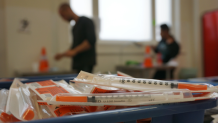
Investigiative Unit Granted Rare Access Inside Drug Sites
To see the sites firsthand, the NBC Bay Area Investigative Unit traveled to Vancouver, Canada and gained access inside these rarely seen drug facilities.
“It’s not enabling drug users, it’s enabling drug users to seek care,” said Darwin Fisher, who runs Insite, North America’s first supervised injection site situated on the eastside of Vancouver. “People come into a hygienic space with running water, a roof over them, nursing care, and people who will support them in the event of an overdose.”
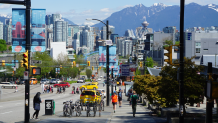
'It Looks Like a Hair Salon'
The facility, which opened in 2003, is a stark contrast to the dark and dirty alleys that are often synonymous with drug use.
“I didn't expect it to be the way it looks -- it looks like a hair salon,” said Alex Randolph, Vice President of the Board of Trustees for San Francisco City College. “It doesn't look like a medical facility.it looks very inviting."
Randolph was one of more than 30 business and government leaders from San Francisco to tour one of Vancouver’s supervised injection sites in early May. The trip, organized by the San Srancisco Chamber of Commerce, included representatives from the Mayor’s office, SF Travel, California Growers Association, Lyft, Uber, and several other groups and agenies curious about supervised injection sites.
“I was very impressed,” said Kelli Powers, Vice President of the San Francisco Hotel Council, who was also on the tour. “I think they have a good model here for people that want to come in and use safely.”
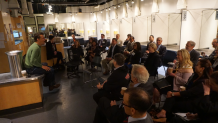
Supervised Injection Sites – Frequently Asked Questions
Darwin Fisher, who manages North America’s first-ever supervised injection site in Vancouver, addresses a few frequently asked questions regarding the facility. To get started, click a question below.
Supervised Drug Site Reduced Amount of Used Needles on Streets
In the three months after Insite opened its doors, the amount of discarded syringes on streets and sidewalks declined by more than half within the 10 blocks surrounding the supervised injection site.
Addicts who use the facility are assigned their own station and provided sterile syringes and a place to dispose of them. When someone overdoses, trained staff step in to inject life-saving drugs. Workers also help addicts get into housing and enroll in rehab services.
“Maybe not the first time, and maybe not the second or third time, but maybe on the 10th time they visit the site, the user asks about treatment,” Kral said.
Drug Sites Feel Like 'Home' to Addicts
“It's hard to really explain, but it's like home here,’ said Stephanie Peterson, a drug user who frequents Vancouver’s supervised injection sites. “When I first started coming here it was, obviously, for my drug use, but I've developed a very big relationship with a majority of the workers,” she said. “I look at them like a family so I come here to use, but I also come here when things are rough.”
Peterson, 28, said the sites have given her a second chance at life – in more ways than one. She has continued to use drugs since running away from home at 13. Since then, she has more often than not been homeless. Since visiting the Molson Overdose Prevention site in Vancouver, however, she has been able to get housing and now plans to enroll in college.
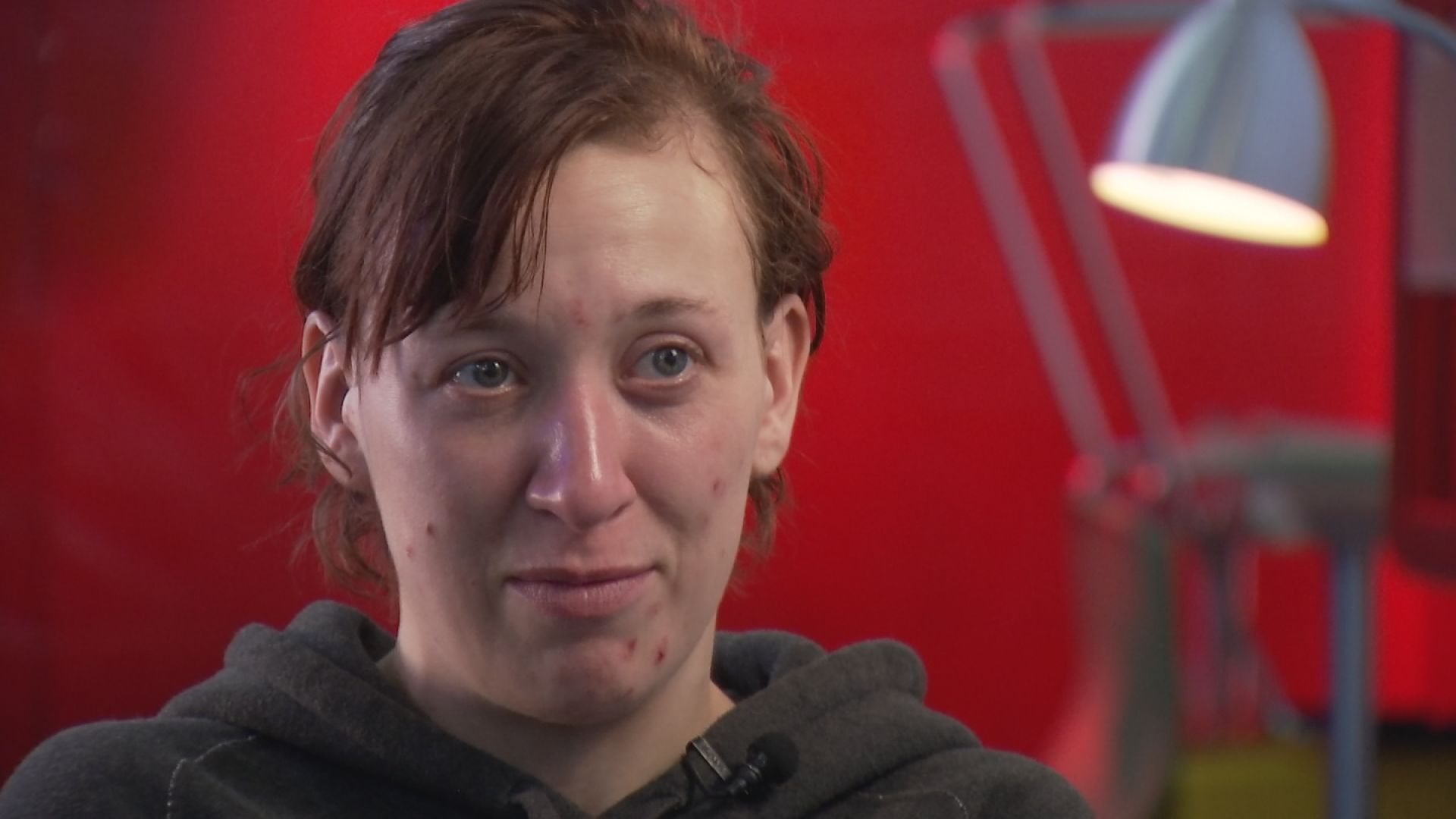
“They’ve helped me realize how bad my drug using was," she said.
For the first time in her life, she says she is finally willing to work towards getting clean.
“I'd want to see myself doing something along the lines of working with these injection rooms,” she said.
In San Francisco, drug centers have broad political support. NBC Bay Area surveyed all 11 members of the San Francisco Board of Supervisors. Eight supervisors declared support for the sites, including Supervisors Sandra Lee Fewer, Catherine Stefani, Aaron Peskin, Katy Tang, London Breed, Jane Kim, Jeff Sheehy, and Hillary Ronan. Supervisor Malia Cohen declined to comment, while Supervisors Norman Yee and Ahsah Safai did not respond to the request.
“I am supportive of safe injection sites with the caveat that appropriate programming and services, such as access to substance use treatment programs…needs to accompany the sites,” Sheehy told the Investigative Unit.
San Francisco, however, faces considerable legal hurdles. Advocates for the centers say they fully expect the sites to be raised by federal drug agents.
State legislation has been proposed to legalize these centers, but the Drug Enforcement Administration said the sites still break federal law, meaning anyone using them or even working inside could face prosecution.
“Any facilitation of illicit drug use is considered in violation of the Controlled Substances Act (CSA) and, therefore, subject to legal action,” said a statement provided by the Drug Enforcement Administration.
In San Francisco, nearly 200 people die of an overdose each year.
Tiffany Falstitch, speaking from her tent on Ellis Street in San Francisco, isn’t sure how much longer she can survive on the streets and on heroin.
“I've been out here for so long,” she said, tearfully. “It would take literally like a crumb to make me feel like you know I was worth something again, you know.”
Contact The Investigative Unit
submit tips | 1-888-996-TIPS | e-mail Bigad Shaban



